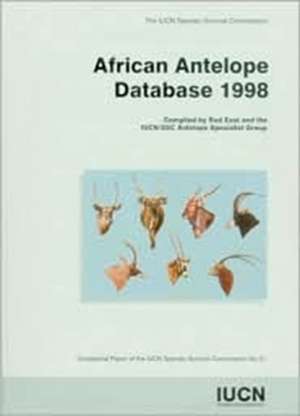African Antelope Database 1998: IUCN Species Survival Commission Paper
Editat de Rod Easten Limba Engleză Paperback – 31 dec 1998
Although most antelope species still exist in large numbers in sub-Saharan Africa (some in hundreds of thousands), up to three-quarters of the species are in decline. Threats to their survival arise from the rapid growth of human and livestock populations, with consequent degradation and destruction of natural habitats, and excessive offtake by meat hunters. In addition, some parts of Africa are now almost completely devoid of large wild animals because of uncontrolled slaughter during recent civil wars.This report presents the information currently held by the IUCN/SSC Antelope Specialist Group on the conservation status of each antelope species (and selected subspecies) in sub-Saharan Africa. Key areas have been identified for the conservation of representative antelope communities. While external donors make the greatest contributions to the conservation of antelopes, greater recognition of wildlife conservation in national and regional development plans is often a critically important requirement.
Preț: 365.22 lei
Nou
Puncte Express: 548
Preț estimativ în valută:
69.89€ • 72.20$ • 58.17£
69.89€ • 72.20$ • 58.17£
Carte indisponibilă temporar
Doresc să fiu notificat când acest titlu va fi disponibil:
Se trimite...
Preluare comenzi: 021 569.72.76
Specificații
ISBN-13: 9782831704777
ISBN-10: 2831704774
Pagini: 444
Dimensiuni: 140 x 178 x 28 mm
Greutate: 1.37 kg
Ediția:None
Editura: Island Press
Colecția World Conservation Union
Seria IUCN Species Survival Commission Paper
ISBN-10: 2831704774
Pagini: 444
Dimensiuni: 140 x 178 x 28 mm
Greutate: 1.37 kg
Ediția:None
Editura: Island Press
Colecția World Conservation Union
Seria IUCN Species Survival Commission Paper
Descriere
Although most antelope species still exist in large numbers in sub-Saharan Africa (some in hundreds of thousands), up to three-quarters of the species are in decline. Threats to their survival arise from the rapid growth of human and livestock populations, with consequent degradation and destruction of natural habitats, and excessive offtake by meat hunters. In addition, some parts of Africa are mow almost completely devoid of large wild animals because of uncontrolled slaughter during recent civil wars. This report presents the information currently held by the IUCN/SSC Antelope Specialist Group on the conservation status of each antelope species (and selected subspecies) in sub-Saharan Africa. Key areas have been identified for the conservation of representative antelope communities. While external donors make the greatest contributions to the conservation of antelopes, greater recognition of wildlife conservation in national and regional development plans is often a critically important requirement.
